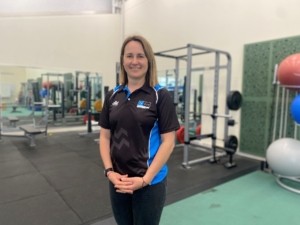
EIT’s new Acting Head of the School of Health and Sports Science, Dr Helen Ryan-Stewart, brings a wealth of experience to the role.
EIT’s Acting Head of the School of Health and Sports Science, Dr Helen Ryan-Stewart, is an experienced sports scientist from the United Kingdom, who believes EIT|Te Pūkenga has many research collaboration opportunities ahead.
Helen joined EIT earlier this year from the University of Winchester, where she obtained her PhD in Sport and Exercise Science in 2020. She has previously worked at Massey University in Auckland.
Initially appointed to the role of Assistant Head of School, Helen has just been made Acting Head of School following the secondment of Dr Ondene van Dulm, to Te Pūkenga
Helen says she is pleased to have moved to Hawke’s Bay with her husband, Ben, who is originally from the region, and their two children.
“It was always the plan to return to New Zealand and the time seemed right after I was awarded my PhD. I loved living here the first time and we knew it was probably where we wanted to settle long term.”
“I had known about EIT for a while so when this role came up, it just seemed like a perfect opportunity to put in some of the skillsets that I’d learned at Winchester into a specific role.”
Helen brings with her experience in sports science and expertise in resistance training techniques. She is internationally accredited to teach and examine a skill called anthropometry, which is the scientific study of the measurements and proportions of the human body.
“When I was originally designing my PhD, I was working with a local, semi-professional rugby team as their sports scientist, so I decided to combine what I was doing with them with a PhD.”
“I focused on an area called somatotyping, which is about using numbers to express somebody’s natural physique. It’s a three numerical rating that gives you an idea of what somebody’s physique is around musculoskeletal robustness, adiposity and linearity. I looked at how people of different physiques respond differently, particularly to resistance training.”
Originally from the UK Midlands town of Shrewsbury, Helen grew up active in track and field and also played representative netball. This interest in sport led her to gain her B.Sc. (Hons) in Sport and Exercise Science from the University of Bath in 2004. As part of her degree, Helen did a practical placement at Lilleshall National Sports and Conferencing Centre, which is well regarded as a human performance and rehabilitation centre.
When she graduated, an opportunity arose for her to become Sport and Exercise Science Laboratory Manager at Massey University in Auckland, where she studied part-time for a MSc in Sport and Exercise Science. Her thesis was The Development of a reliable and valid netball intermittent activity test. It was during this time that she met her husband, Ben and in 2008, they returned to the UK where she took up a position at the University of Winchester.
Returning to New Zealand earlier this year, Helen has taken up her role at a time when EIT is about to transition into Te Pūkenga, the New Zealand Institute of Skills and Technology.
Helen says Te Pūkenga, which brings together all 16 Institutes of Technology and Polytechnics (ITPs) as well as nine Industry Training Organisations, gives the institute’s schools opportunities for collaboration in teaching and research.
“Our school hosted a summit recently for our colleagues from all the ITPs in Te Pūkenga to talk about working together moving forward. We agreed that there are many research opportunities for us to collaborate on and find strength in numbers around those research projects.”
Helen says this unity could also help in the transfer of students.
“If we’ve got a student who is really interested in cycling for example, we could send them to Wintec to be near the Velodrome. If they have a student who’s really interested in swimming, it makes sense for them to come our way because of the new Hawke’s Bay Regional Aquatic Centre.”
Helen says that while sport is her original research area, the COVID-19 pandemic has seen her extend this into the exercise and health area as well. With a background in universities, she is enjoying working with students at a pre-degree and certificate level.
“I’m finding it exciting to listen to the experiences of some of the learners at the certificate level. EIT gives them an opportunity to continue on to degree level and is a good model of encouraging learners who might not have gone down that traditional university route previously.”

